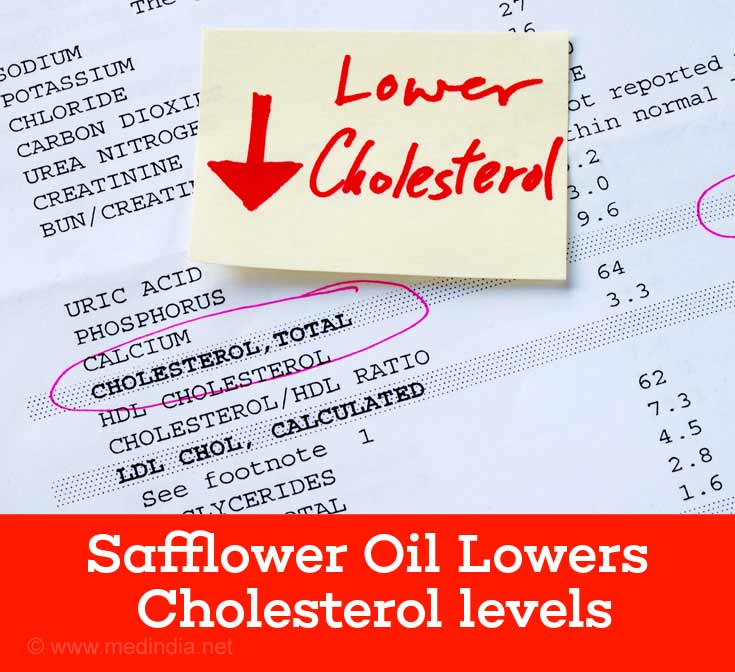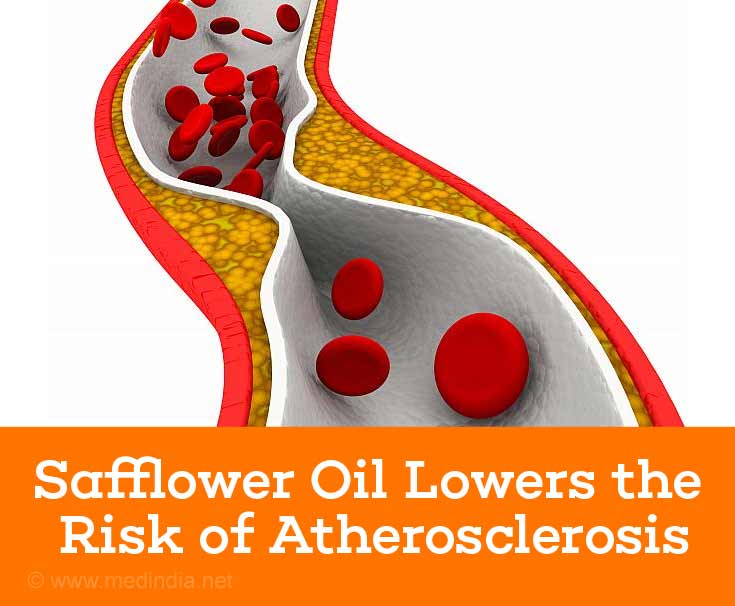- The Benefits of Safflower Oil - (http://safflowerseedsoil.org/)
- The importance of omega-3 and omega-6 fatty acids - (http://www.eufic.org/en/food-today/article/the-importance-of-omega-3-and-omega-6-fatty-acids)
- Omega 6 Benefits - (http://omega6.wellwise.org/omega-6-benefits)
- Health Implications of High Dietary Omega-6 Polyunsaturated Fatty Acids - (https://www.ncbi.nlm.nih.gov/pmc/articles/PMC3335257/)
What is Safflower Oil?
Which cooking oil is healthiest for me and my family? We are often confused and worried when it comes to choosing an oil for everyday use in the kitchen. It's a general notion that oils are harmful to health, increase blood cholesterol levels or make us fat. But, do we really know much about the various oils available in the market, their benefits and side-effects? Safflower oil is one such vegetable oil with numerous health benefits.
Safflower oil is extracted from seeds of the safflower plant, also known as Carthamus Tinctorius and belonging to the Compositae family. It has properties very similar to the sunflower and typically blooms in summers. Safflower oil has high nutritive value and is known to be a heart-friendly oil. Monounsaturated and polyunsaturated are the types of safflower oil available in the market. The monounsaturated version though not healthier than the polyunsaturated one, is more shelf-stable.
Safflower Oil Benefits
- Safflower oil is used extensively in cooking.
- It is used for industrial purposes as an ingredient in paints and varnishes, as dye or coloring agent.
- In replacement of linseed oil, you can use safflower oil for your oil paintings.
- Devoid of chemicals, safflower oil is a healthier product to use as a hair conditioner to restore shine and luster to your hair.
- Dried safflower is commonly used as a spice.
Apart from these uses, it is packed with immense health benefits such as the ones listed below.
1. Lowers Cholesterol levels
Safflower oil contains unsaturated fatty acids, especially omega-6 fatty acids that help in lowering cholesterol levels in the body. Safflower oil also contains linoleic acid that reduces low-density lipoprotein (LDL) cholesterol. LDL is the primary marker for heart diseases. Safflower oil is a choice for many who suffer from hypercholesterolemia (i.e. high cholesterol levels).

2. Controls Diabetes
Regular consumption of safflower oil will help prevent diabetes. Safflower oil is loaded with polyunsaturated fatty acids of plant origin which help in increasing insulin sensitivity. The omega-6 fatty acids in the safflower oil help reduce blood sugar levels and thus can be consumed by diabetic patients too. Safflower oil has been proven to reduce HbA1C levels too.
3. Controls Atherosclerosis
Safflower oil is well known for reducing inflammation and preventing thickening of blood vessels thereby preventing atherosclerosis. Also, the linoleic acid in safflower oil prevents hardening of the arteries. The polyunsaturated fatty acids decrease the chance of formation of fatty plaques in the blood vessels and help to have a healthy heart.

4. Stroke
To reduce the risk of thrombosis or internal blood clots and prevent strokes, use polyunsaturated safflower oil that possesses anti-ischemic properties. It is known to lower cholesterol levels and prevent atherosclerosis.
A study says that if daily 8 grams of safflower oil is consumed, it will help in reducing belly fat. Adding safflower oil in your diet is recommended as it increases the serotonin levels in the body. Serotonin is also called as the ‘happy hormone’ in everyday parlance, and on consumption, safflower oil stimulates the release of serotonin. You can lose weight without being depressed now! Safflower oil is rich in omega-6 fatty acids which help burn fat and prevent becoming overweight if appropriately used in cooking.

6. Pruritus / Itching
Safflower oil is beneficial not only when consumed but its application can also be more useful because of linoleic properties which can help relieve itching of the body. Safflower oil moisturizes the body and prevents pruritus If added to the water while bathing, it helps to remove all the impurities on the skin. Due to itching and scratching, you may leave marks on the skin surface, and safflower oil can come to rescue. When applied to the scars it helps to lighten them and makes the skin look healthy and bright.
7. Heart attack
In the early middle ages, safflower petals were believed to improve blood circulation and today research has proven the benefits of safflower oil in preventing heart attacks.

8. Pre-menstrual syndrome (PMS)
Cold-pressed safflower oil can regulate the prostaglandins in the body with the help of high linoleic acid. The regulation of prostaglandins will monitor all the hormones and thus prevent symptoms like pain and cramps in the abdomen which occur before or during menstrual cycles.
9. Constipation
If you repeatedly suffer from constipation, then you might need safflower oil. Safflower oil acts as a lubricant in the large intestine working as a mild laxative and offering relief from straining at hard stools. Safflower oil overall helps in digestion by strengthening the stomach and intestines. Liver and spleen enlargement also can be handled if a little safflower oil is added to the daily diet. Not all oils are dangerous; those like safflower oil are great to clear the bowels.

10. Anti-inflammatory
Safflower oil is rich in omega 6 fatty acids and also contains vitamin E. This combination makes it a potent anti-inflammatory agent.
11. Wound Healing
High linoleic safflower cold pressed oil when applied to a long-standing, non-healing wound can help in healing. However, it should be done after consulting a doctor because if the wound is severe and not cleaned up properly, application of oil will only accumulate dirt and make the wound septic. Regular use will protect the body from skin infections.
Safflower oil is full of antioxidants which will protect from bacterial infections and harmful free radical growth thus preventing any infections.









